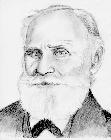Ivan Pavlov (1849 - 1936)
 Ivan Petrovich Pavlov was born on September 27 in Ryazan, a small town in central Russia. He was the eldest of 11 children and the
son a village priest. He too intended to become a priest and even attended a theological seminary. While he did not complete his
studies there, it was during this time that he became intrigued with the natural sciences. Pavlov pursued this interest at St.
Petersburg University, graduating in 1875. In order to prepare for a career in physiology, he then enrolled at the Military Medical
Academy to study for an MD degree, which he received in 1879. He was appointed professor of physiology at the academy in 1890, where
he was to spend most of the remainder of his career. His work on the physiology of digestion began around 1879, for which he was
awarded a Nobel prize in 1904.
Ivan Petrovich Pavlov was born on September 27 in Ryazan, a small town in central Russia. He was the eldest of 11 children and the
son a village priest. He too intended to become a priest and even attended a theological seminary. While he did not complete his
studies there, it was during this time that he became intrigued with the natural sciences. Pavlov pursued this interest at St.
Petersburg University, graduating in 1875. In order to prepare for a career in physiology, he then enrolled at the Military Medical
Academy to study for an MD degree, which he received in 1879. He was appointed professor of physiology at the academy in 1890, where
he was to spend most of the remainder of his career. His work on the physiology of digestion began around 1879, for which he was
awarded a Nobel prize in 1904.
While studying the digestive reflexes of dogs, in particular, the secretion of digestive juices in response to food in the mouth, Pavlov noticed a peculiar thing. Experienced subjects started salivating as soon as he or one of his assistants entered the room, that is, before the food was even tasted. He refers to this phenomenon in the passage below as "psychic secretion."
"In the course of a detailed investigation into the activities of the digestive glands I had to inquire into the so-called psychic secretion of some of the glands, a task I attempted in conjunction with a collaborator. As a result of this investigation, an unqualified conviction of the futility of subjective methods of inquiry was firmly stamped on my mind. It became clear that the only satisfactory solution of the problem lay in an experimental investigation by strictly objective methods. For this purpose I started to record all external stimuli falling on the animal at the time its reflex reaction was manifested (in particular the secretion of saliva), at the same time recording all changes in the reaction of the animal." (Pavlov, 1927/1960, p. 6)
Pavlov's experiments revealed that dogs salivated to any stimulus that signaled food delivery, termed a learned or conditioned reflex. In 1903, he presented a paper on The Experimental Psychology and Psychopathology of Animals, in which he defined conditioned and other reflexes and bridged the gap between physiology and psychology. The last thirty-four years of his life (1902-1936) were devoted almost exclusively to the study of the functions of the cerebral cortex by the method of conditioned reflexes (Babkin, 1979).
Pavlov's influence on psychology has been tremendous. In the Biographical Dictionary of Psychology (Sheehy, Chapman, & Conroy, 1997) he is said to have laid the foundation for both modern learning theory and modern brain research. In addition,
"[t]echnically, Pavlov provided most of the terms and laws of the experimental psychology of learning, e.g., conditioning, conditioned reflex, unconditioned reflex, reinforcement, extinction, spontaneous recovery, discrimination, generalization, differentiation, inhibition, disinhibition, and higher order conditioning. He also provided a model for experimentation ignored in the West until the operant laboratories adopted similar methods in the 1950s. The approach was to experiment at length on the same subject until the data obtained showed a steady and prolonged effect. Also, Pavlov required no statistical methods to determine whether he had a significant result: repeated measures ensured that each result was replicated many times before he concluded that a finding was secure." (p. 441)
Pavlov was critical of the prevailing introspective psychology of his time, warned his students to stay away from it, and even penalized his staff for using psychological terms. In his later years, he extended his work on conditioned reflexes to include behavior and problem solving in anthropoid apes. At the International Physiological Congress in 1935, Pavlov was proclaimed the world's foremost physiologist. The next year, on February 27, he died of pneumonia at the age of 87.
Access other links related to the life of Ivan Pavlov.